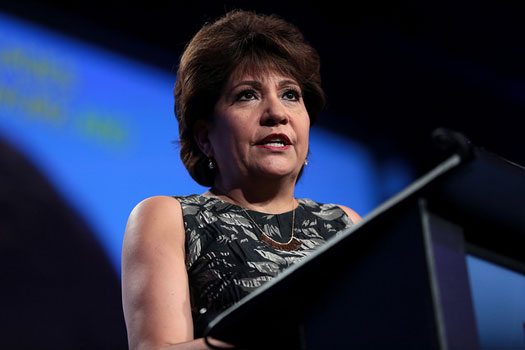
July 10, 2017; NBC News, “Latino”
Reflecting changes in national organizing strategy and the makeup of its communities, the National Council of La Raza has announced it has changed its name to UnidosUS, meaning “United U.S.” or “Us, United.”
NCLR President and CEO Janet Murguía officially announced the change last night at the organization’s annual conference, saying that the shift was in the works for a while. The new name took effect at midnight.
As some readers may remember, the very name “La Raza” has been criticized by conservatives, interpreting “the race” as in “our race above all others,” a translation that was, willfully inaccurate. But that persistent misinterpretation, says Murguía, was not any part of the reason for the name change, and the organization does not expect that the change will stop any attacks on the organization’s work.
“We’ve been working really hard on this process for some time,” Murguía told NBC. “It was our own community that led us to the UnidosUS name. We see ‘unidos’ as a call to action, but it also signals a message to join us and come together and do what is best for our country.”
Sign up for our free newsletters
Subscribe to NPQ's newsletters to have our top stories delivered directly to your inbox.
By signing up, you agree to our privacy policy and terms of use, and to receive messages from NPQ and our partners.
Murguía explained that the name also reflects changes within the community. “Not only are six in 10 Hispanics millennials or younger, we as a community marry outside of our community more than any other ethnic or racial population.”
“We are changing,” she said.
Although the name change has been under consideration since 2008, the organization began to consult its community about the shift in earnest three years ago. It goes into effect as volunteers and money are flowing toward more coherent organizing and legal efforts for organizations working with immigrants and refugees.
“I can’t point to an easier time to organize in recent history,” said Apolonio Morales, political director for the Coalition for Humane Immigrant Rights of Los Angeles. He says he now collaborates with refugee resettlement groups, Black Lives Matter protesters, LGBT advocates, and others to make the changes needed in an increasingly hostile atmosphere.
“There’s a lot of commonality right now and a lot of folks are looking over their fence to see what’s around them and see how they can help out,” Morales said.—Ruth McCambridge











